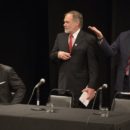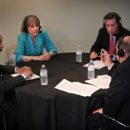Massachusetts voters will see five names on the ballot for governor in November. that includes three independents. For them, it’s been difficult to make a mark on the race. And two of those candidates have spent over a million dollars of their own money.

Independent candidate for governor Jeff McCormick is standing in front of the offices of MGM Springfield in the city’s downtown. It’s a brisk, clear fall day. McCormick is here with three campaign staffers, and two reporters, including me. We’re waiting for a third reporter. So McCormick makes small talk.
“What a spectacular day, huh?” he asks us.
Such is the fate of a self-funded independent candidate…talking about the weather with the few reporters who show up for your press conference. McCormick’s here to announce his jobs plan, and highlight his opposition to casinos. But there’s not a single supporter in sight, and doing this kind of campaigning isn’t cheap for McCormick. So far he’s spent $1.1 million of his own money.
“I think it’s useful to spend money to improve the state you live in, and to be a voice for the people, to give people a real choice, and a real voice,” says McCormick.
McCormick is a venture capitalist, and he touts the jobs and companies he’s created over the last 27 years as evidence of his ability to improve the economy as governor. But according to recent polls, only two percent of voters at best are buying his message. That’s also the case for another “outsider” candidate, Evan Falchuk. He has a couple motives in this race.
“Our goal is to bring about smart, brave reform of our politics, economy and government, and to do that by winning this election and founding the United Independent Party so that we can have a framework for lots of new independent people to get into the system,” says Falchuk.
The United Independent Party is Falchuk’s idea for a third party he hopes can compete in future elections. To do that, he needs to get three percent of the vote in this election.
“You get three percent of the vote, just three percent, your organization becomes an official party, so United Independent after this election will be an official party,” says Falchuk.

“The big reason why that matters is that there’s a new slate of legislative elections in 2016.”
For Falchuk, three percent is a realistic goal. He’s been polling around one or two percent. But the cost so far? Just over $1.5 million dollars of his own money. Falchuk wasn’t clear about how much more he plans to spend, but says a successful gubernatorial campaign shouldn’t cost a lot more than 3 million dollars.
For all their personal spending, in some polls, Falchuk and McCormick are still trailing the third independent candidate in the race: Scott Lively. He calls himself the “only moral conservative on the ballot.”

Lively is a Springfield-based preacher best known for his strong anti-gay views. Compared to Falchuk and McCormick, he’s spent next to nothing personally on this campaign: $2,000. But Lively’s raised some money too, about $20,000. Many of those donations are from outside the state, places like California, Missouri, and Alabama.
“My platform is the strongest, from a biblical standpoint, of any candidacy of anyone running anywhere in the United States,” says Lively. “So where better to shine the light than where the darkness is the darkest?”
Lively calls Massachusetts “the most morally corrupt state in the union.” He says he’s not exactly campaigning to bring new voters to his side, but to provide an electoral option for conservative Christians to rally around.
Lively’s low-cost campaign makes him an outlier among the three independents in the race. Falchuk and McCormick are taking a well-worn path in American politics.
“Self-funded candidates across the country at all levels, tend to have a very abysmal record of winning,” says Ed Bender, the director of the National Institute for Money in State Politics, based in Montana. He says about three quarters of candidates who fund their own campaigns lose. Those who win, Bender says, usually have strong public name recognition, like former New York City Mayor Michael Bloomberg.
“In the case of Bloomberg, you have a person who is a personality. He is a very strong figure, and he was in the news a lot, and he was at events,” says Bender.
But there’s another key difference between the Bloombergs of the world, and Jeff McCormick and Evan Falchuk: major party support. Bloomberg first ran as a Republican. McCormick and Falchuk have to the build their volunteer and campaign organizations from the ground up. Still, they believe they can be the next Massachusetts governor. Scott Lively is the independent candidate with possibly the most realistic view.
“I don’t expect to win, and if I did it would be a complete and total miracle from God,” says Lively
Stay tuned to see if Lively, or any of these candidates, get their miracle on November 4th.


